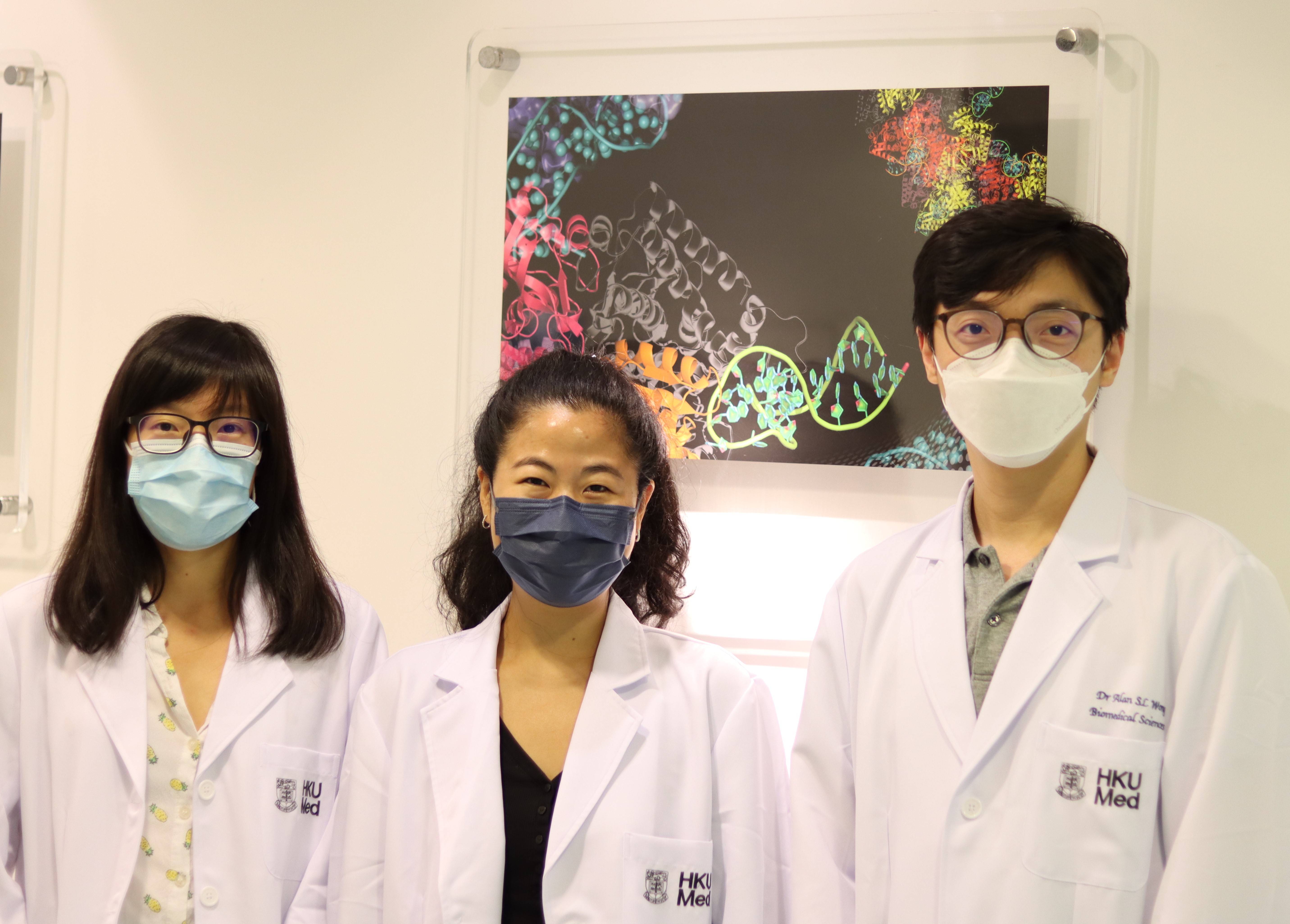29 June 2022
A research team from the LKS Faculty of Medicine, The University of Hong Kong (HKUMed) discovered more efficient CRISPR-Cas9 variants that could be useful for gene therapy applications. By establishing a new pipeline methodology that implements machine learning on high-throughput screening to accurately predict the activity of protein variants, the team expands the capacity to analyse up to 20 times more variants at once without the need for acquiring additional experimental data, which vastly accelerates the speed in protein engineering. The research team has successfully applied the pipeline in several Cas9 optimisations and engineered new Staphylococcus aureus Cas9 (SaCas9) variants with enhanced gene editing efficiency. The findings are now published in Nature Communications (link to the publication) and a patent application has been filed based on this work.
Background
Staphylococcus aureus Cas9 (SaCas9) is a great candidate for in vivo gene therapy due to its small size allowing packaging into adeno-associated viral vectors to be delivered into human cells for therapeutic applications. However, its gene editing activity could be insufficient for some specific disease loci. Further optimisations of SaCas9 are crucial in precision medicine before it can be used as a reliable tool to treat human diseases. Such optimisations consist of boosting its efficiency and precision by altering the Cas9 protein. Standard protocol for modifying the protein entails saturation mutagenesis, where the number of possible modifications that could be introduced to the protein far exceeds the experimental screening capacity of even the state-of-art high-throughput platforms by orders of magnitudes.
In this work, the research team explored if combining machine learning with structure-guided mutagenesis library screening could enable the virtual screening of many more modifications to accurately identify the rare and better performing variants for further in-depth validations.
Research findings
The research team tested the machine learning framework on several previously published mutagenesis screens on Cas9 variants and illustrated that machine learning could robustly identify the best performing variants by using merely 5-20% of the experimentally determined data.
The Cas9 protein contains several parts, including protospacer adjacent motif (PAM)-interacting (PI) and Wedge (WED) domains to facilitate its interaction with the target DNA duplex. The research team coupled the machine learning and high-throughput screening platforms to design activity-enhanced SaCas9 protein by combining mutations in its PI and WED domains surrounding the DNA duplex bearing a (PAM). PAM is essential for Cas9 to edit the target DNA and the idea was to reduce the PAM constraint for wider genome targeting whilst securing the protein structure by reinforcing the interaction with the PAM-containing DNA duplex via the WED domain.
In the screen and subsequent validations, the researchers identified new variants, including one named KKH-SaCas9-plus, with enhanced activity by up to 33% at specific genomic loci. The subsequent protein modelling analysis revealed the new interactions created between the WED and PI domains at multiple locations within the PAM-containing DNA duplex, attributing to KKH-SaCas9-plus's enhanced efficiency.
Research significance
Structure-guided design has been dominating the field of Cas9 engineering; however, it only explores a small number of sites, amino-acid residues, and combinations. In this study, the research team showed that screening with larger scale and less experimental efforts, time and cost can be conducted using the machine learning-coupled multi-domain combinatorial mutagenesis screening approach, which led them to identify a new high-efficiency variant KKH-SaCas9-plus.
‘This approach will greatly accelerate the optimisation of Cas9 proteins, which could allow genome editing to be applied in treating genetic diseases in a more efficient way,’ said Dr Alan Wong Siu-lun, Assistant Professor of the School of Biomedical Sciences, HKUMed.
About the research team
This research was led by Dr Alan Wong Siu-lun, Assistant Professor of the School of Biomedical Sciences, HKUMed, as the corresponding author. Ms Dawn Thean Gek-lian, Research Assistant; Dr Athena Chu Hoi-yee, Postdoctoral Fellow, School of Biomedical Sciences, HKUMed, were co-first authors, with assistance from Mr Fong Hoi-chun, PhD student; Ms Becky Chan Ka-ching, PhD student; Dr Zhou Peng, Postdoctoral Fellow; Ms Cynthia Kwok Chui-shan, Research Assistant, and Dr Gigi Choi Ching-gee, Postdoctoral Fellow, School of Biomedical Sciences, HKUMed. Other collaborators included Dr Joshua Ho Wing-kei, Associate Professor of the School of Biomedical Sciences, HKUMed; Dr Zheng Zongli and his team from Ming Wai Lau Centre for Reparative Medicine, Karolinska Institutet, Hong Kong node.
Acknowledgement
This work was supported by the Excellent Young Scientists Fund, National Natural Science Foundation of China (32022089), the Hong Kong Research Grants Council (17104619), and the Centre for Oncology and Immunology Limited under the Health@InnoHK Programme launched by the Innovation and Technology Commission, the Government of Hong Kong Special Administrative Region (HKSAR). This work was also in part supported by the Ming Wai Lau Centre for Reparative Medicine Associate Member Programme and the AIR@InnoHK launched by the Innovation and Technology Commission, the Government of HKSAR.
Media enquiries
Please contact LKS Faculty of Medicine of The University of Hong Kong by email (medmedia@hku.hk).


Follow HKUMed